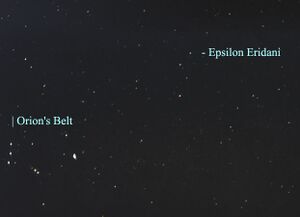Epsilon Eridani system: Difference between revisions
From Halopedia, the Halo wiki
m (Reverted edits by Chief 2008 (Talk); changed back to last version by Spirit-of-HALO) |
No edit summary |
||
| Line 15: | Line 15: | ||
Humans held the system for several hundred years, until the [[Battle of Reach]] in [[2552]]. After that, the system came under control of the [[Covenant]]. | Humans held the system for several hundred years, until the [[Battle of Reach]] in [[2552]]. After that, the system came under control of the [[Covenant]]. | ||
It was home to many of the [[UNSC]]'s strongholds and military bases, such as [[Reach]] . | It was home to many of the [[UNSC]]'s strongholds and military bases, such as [[Reach]]. | ||
==Colonies== | ==Colonies== | ||
Revision as of 17:10, November 26, 2008
Coordinates: 3h 32m 55.8s RA, --9° 27' 29.7" Declination[1]
Distance: 10.5 light years from earth[2]
Star: K2V orange-red dwarf [3]
Number of planets: ??
The Epsilon Eridani System is 10.5 light years from Earth and is in FLEETCOM Sector One. It is home to several habitable planets, and until 2552 the most notable was Reach. At 10.5 light years from the Sol System, it is one of the closest neighbors of humanity's homeworld.
Humans held the system for several hundred years, until the Battle of Reach in 2552. After that, the system came under control of the Covenant.
It was home to many of the UNSC's strongholds and military bases, such as Reach.
Colonies
Epsilon Eridani is home to several planets, with at least three of them known to be inhabited;
- Epsilon Eridani b - a Gas Giant discovered in 2000. Likely renamed after system colonization.
- Reach - the former military center of the UNSC, and the most developed UNSC colony. Glassed by the Fleet of Particular Justice in 2552.
- Circumstance - famous for its universities and courts of justice. Status unknown.
- Tribute - a recently set up colony, known for its industrial capacity. Status unknown.
- Beta Gabriel - unknown whether it has been colonized.
Real Life
Scientific observation has deduced the presence of an inner rocky asteroid belt, an outer icy belt, and at least three planets: a gas giant the size of Jupiter, and possibly two terrestrial planets, near the inner and outer belts respectively.[4]
External Links
- Eridanus Constellation
- Epsilon Eridanus at Wikipedia
- Epsilon Eridani
